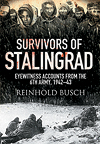
Survivors of Stalingrad: Eyewitness Accounts From the Sixth Army, 1942–43, by Reinhold Busch, Frontline Books, Barnsley, U.K., 2014, $39.95
After Adolf Hitler failed to conquer Moscow in 1941, he turned south toward the prized Caucasian oilfields. However, this meant stretching the front more than 400 miles, a strategic blunder foreseen by many top Nazis. After the Russians broke the front in November 1942, the Sixth Army was encircled in Stalingrad. Hitler ordered resistance to the last round but made no attempt to break the Russian stranglehold. Some 140,000 Germans perished, many starving or freezing to death, until the siege ended in February 1943. And just 6,000 of the 90,000 Germans the Russians captured survived the Soviet prison camps.
In Survivors of Stalingrad German historian Reinhold Busch presents 39 eyewitness accounts, including interviews, reminiscences from veterans’ newsletters, diaries and short essays. The tone throughout is one of humble awe, or quiet terror, at the suffering and brutality of that time. Many blame Hitler, but surpassing even their anger is their frank astonishment at survival.
The book provides countless striking details: lines of amputated, upturned horses’ legs marking the edges of a snowed-in road; a house in which the Russians occupy the ground floor and the Germans the first floor and the basement, neither side wanting to destroy the house before winter; and a novice driver transporting a general right up to the Russian front line.
Survivors of Stalingrad underlines the grim determination of the Germans. Busch has done a commendable job in compiling a range of accounts, many from the relatively lower ranks. The result is a solid if disquieting addition to the literature on Stalingrad.
—Andre van Loon




